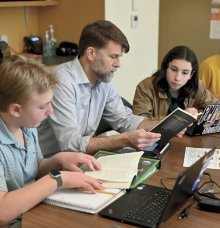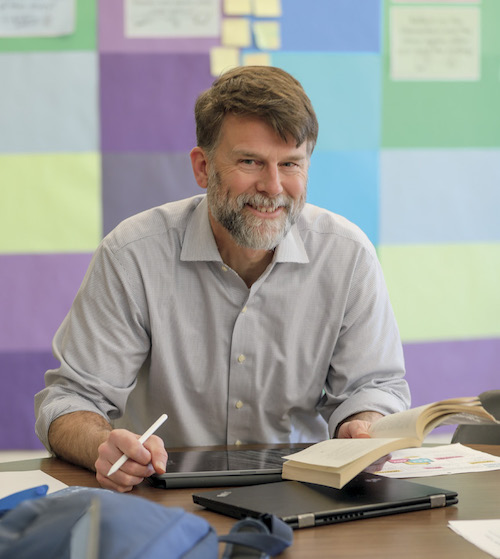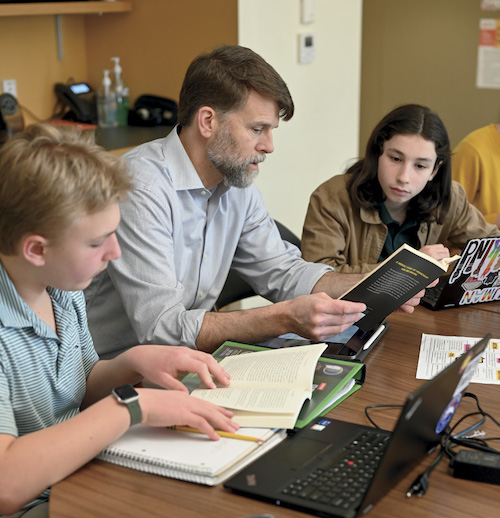
Words Matter to Middle School English Teacher Michael McGovern
By Andrew Niblock, Director of Schoolwide Initiatives
 Middle School English teacher and Department Chair, Michael McGovern cares deeply about words and the craft of putting them together to say something important, whimsical, or magical. Spending time in his classroom is both a calming breath and a challenge to stretch and strengthen your literary muscles, but be prepared. He isn’t going to do it for you.
Middle School English teacher and Department Chair, Michael McGovern cares deeply about words and the craft of putting them together to say something important, whimsical, or magical. Spending time in his classroom is both a calming breath and a challenge to stretch and strengthen your literary muscles, but be prepared. He isn’t going to do it for you.
One of McGovern’s favorite analogies is of his class as a hardware store. He’s got lots of tools available and a knowledge of how to use each, and when. Every day, McGovern welcomes students to the store through an exploration of poetry and prose at a time in their lives when finding and cultivating a written voice couldn’t be more important, or challenging.
Middle School teachers are a special breed of educator, and McGovern has been navigating these waters for 22 years. I had the opportunity to ask him about teaching and about the wonder of words.
When did you fall in love with words?
The day I realized I loved the word “smock” simply because it’s fun to say, and because Bill Watterson loved it too when he used it in one of his Calvin and Hobbes comic strips which still makes me smile.
What is something we all should learn, or unlearn, about the English language?
Words matter. Words evolve. Choosing not to say or write something can be just as powerful as any word of hate, enlightenment, inspiration, or wisdom.
What about writing/reading inspires you?
Perpetual process. When I know it’s a worthy topic to think about, that’s when I get excited to dig in. I’m like a fish sometimes when it comes to reading and writing. I chase the shining things that move elegantly in my imagination. Topics that have a purpose in the spaces I navigate, that seem relevant to my thoughts, struggles, needs, and curiosities. The challenge is making space for both reading and writing because they take so much time. Once I’ve cleared the decks, so to speak, I love the drafting, peer response, revising, choosing, discarding, saving, laughing, getting angry . . . frustrated, finding success. . . . There are so many emotions. It’s like living in a padded room with a prominent stage with bright lights at the far end if I’m lucky.
When I get excited about something I’m reading or writing, it takes over my life. I talk about it. I use it to reason and make decisions all day. It’s like honey-paste all over my consciousness. I can’t wash it off. I love it when my brain drips into the imagination. That headspace where the internal monologue narrates and quotes and pushes thought.
How do you hope students enter your classroom?
Authentic. I hope they are whoever they are and are ready to be OK with that. I’m ready for them because I get it. Life in the Middle School hallway can be a Class V river. My room should be an eddy where students trust the fact that I’m going to help them transition into a moment I’ve crafted and/or my team has crafted. Hopefully, it’s a moment that lasts and they can find some nourishment.
How do you hope students leave your classroom?
I always say to students that they’re the luckiest people in the world. They wander into this place . . . this space with smart, interesting, and engaged educators. I don’t just mean the adults. Everyone. Students, teachers, staff, and administration. Why are we all here? To learn. There are so many moments in a day. Which ones are you going to choose to hold onto? Which moment did you take a second to jot down somewhere for later perusal? Which, if you’re lucky, will be one of those core memories that stick with you until you’re old and gray . . . a building block for the next step.
I hope students leave my classroom with an ember of impact that lasts at least until they find their next source of fuel.
What have you read recently that needs to be shared?
Braiding Sweetgrass by Robin Wall Kimmerer
Caste by Isabel Wilkerson
The Baseball 100 by Joe Posnanski
Welcome to the Monkey House by Kurt Vonnegut
Any book a librarian suggests.
Why is poetry important for kids?
It’s a useful way to put their thoughts on the page and not be scrutinized for certain mechanics. Internal monologue on the page with a purpose. Mind dump. Truth bombs. Clarity clearance.
Why do you teach?
When I think back to when I was in Middle School, the memories are hazy and filled with angst, anxiety, mistakes, and grief. How cheerful. My father died when I was in eighth grade, and if I really think about it, I probably only have a handful of memories of sixth, seventh, and eighth grade. High school didn’t even start, according to my recollection, until I repeated my junior year to attend school where my mom found a job as an administrative assistant to the Head of School at University School in northeast Ohio. Those two years at U.S. taught me, truly, what being curious and a learner and what reading and writing actually meant. They started to matter. They started to be, well, something. Something that gave me a voice.
Before that? Yeah, nothing comes of nothing.
Why do I teach? I think part of reliving those years vicariously through my students is a sort of personal growth that I’m continually working on, but it’s also because I get really mad about how life can be so unfair to burgeoning and existing teenagers. It’s not fair, really. You have all this nonsense going on, social, educational, executive functioning, family, society . . . everything is bombarding you, and all you’re trying to do is exist.
I teach because I want students to experience meaningful moments in life and take note of them, and create useful strategies that might help them in their next step. I’m a firm believer that the mountain is only as big as the next step you take, so make sure you’re being deliberate.
I want them to leave artifacts for later perusal to be truly analyzed. I want students to have positive learning experiences that affect them and that they can build upon. I want them to go back and look at a journal or something they read and have memories that clearly represent building blocks to who they are as learners and participants in making the world a better place. I want them to know that they exist and that it means something to their circles of concern and consciousness.
I want them to know that all of this is really hard, and that’s OK. Practice makes better. Nothing is perfect, so put that on the shelf. No, practice makes better, and students need to keep at the writing . . . the reading . . . the business of learning. It’s their lifelong job, so it’s time to get after it. After they go outside, get dirty, and mess around a bit . . . of course.
#gcdsms #gcdsfaculty


.jpg&command_2=resize&height_2=85)



.png&command_2=resize&height_2=85)


.jpg&command_2=resize&height_2=85)








.jpg&command_2=resize&height_2=85)



